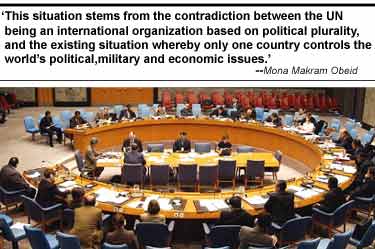Bush denied world support at UN (FCN, 10/06/2003)

UNITED NATIONS (FinalCall.com) – The United Nations Security Council, on October 16, unanimously adopted resolution 1511, which expands the role of the UN in the political transition in Iraq and creates a multinational peacekeeping force, thus giving the United States the international mandate it was seeking in order to get more commitments of troops and money to help rebuild Iraq.
United States Secretary of State Colin Powell called the vote “a great achievement,” adding “We have come together to help the Iraqi people and to put all of our differences of the past in the past.”
But analysts such as Mona Makram Obeid, a former deputy in the Egyptian parliament and a professor of political sciences at American University, say that the UN continues its collapse following the American-led invasion in Iraq because international relations are no longer governed by international law. “This situation stems from the contradiction between the UN being an international organization based on political plurality, and the existing situation, whereby only one country controls the world’s political, military and economic issues,” Ms. Obeid explained.

She said when the war was waged, the international community opposed it, and the UN turned silent. “The international organization thus fell into the hands of the U.S., turning over all its prerogatives to that country,” Ms. Obeid stressed. She added that developing nations would need to take a stand not to have the UN role in world affairs diminished, because it remains their last hope of having a platform where they can express their problems, ambitions and interests. She continued by noting that Arab and Islamic nations also need the UN in a bid to have the Security Council resolutions regarding Israel and Iraq implemented.
The Arab group at the UN has three times, in less than a month, requested Council action to deal with ongoing Israeli aggression in the region. Observers report that in none of these instances was the Security Council able to properly discharge its essential duties or offer any meaningful help.
“The world’s superpower considers it audacious when a member state takes its case against Israel to the Security Council, due to the fact that such action continues to expose American bias and double standards, as it also pushes the United States further on the side of lawlessness,” writes Hasan Abu-Nimah, former ambassador to the UN from Jordan in The Jordan Times.
However, Jeffrey Sachs, director of the Earth Institute at Columbia University, says the world must not let America set its agenda. He said that the Bush administration seems to forget that the war on terrorism “is but one of many wars to fight.
“The horror of September 11, 2001 must never be minimized, but the 3,000 deaths on that day are exceeded every single day in Africa by children dying of malaria,” Mr. Sachs said. “Why, then, is the U.S. spending less than $100 million to fight malaria each year, while spending $100 billion a year on the war on terrorism?” he asked.
He said the U.S. has defined the global agenda for the past two years as the war on terrorism, while allowing all other global problems to fester. “The central problem is global leadership. Though the U.S. accounts for less than five percent of the world’s population, and terrorism represents a comparably small part of the world’s burgeoning problems, the rest of the world has let the U.S. set the agenda,” Mr. Sachs stressed.
The UN ambassador from the Democratic Republic of the Congo told The Final Call that he agreed with those who think like Mr. Sachs. “The issue of Iraq is important, but it is not part of our reality in Africa,” Ambassador Ileka Atoki said, while standing outside of the Security Council chamber after the Iraq resolution vote.
But the ambassador from Angola said he believes that Iraq does concern Africa. “The African Union has been very clear concerning the war, and was not in favor of it, but we must not shun our responsibility to be at the table when the issues are discussed,” Ambassador Ismael Abraao Gaspar Martins said. “I said yes on resolution 1511 to bring the Security Council closer together,” he admitted, adding, “Keeping the Security Council united is the most important issue right now.”
Ivo H. Daalder and James M. Lindsay warn that President George W. Bush has “launched a revolution in American foreign policy” and redefined how America engages the world. In their book “America Unbound: The Bush Revolution in Foreign Policy,” the former staffers in the Bill Clinton administration caution that the Bush revolution comes with significant risks. “Bush’s revolutionary impulse has stirred great resentment abroad. At some point, the president could find that America’s friends and allies will refuse to follow his lead,” Messrs. Daalder and Lindsay wrote. Continuing their warning, they said: “America will then stand alone–a great power unable to achieve its most important goals.”












